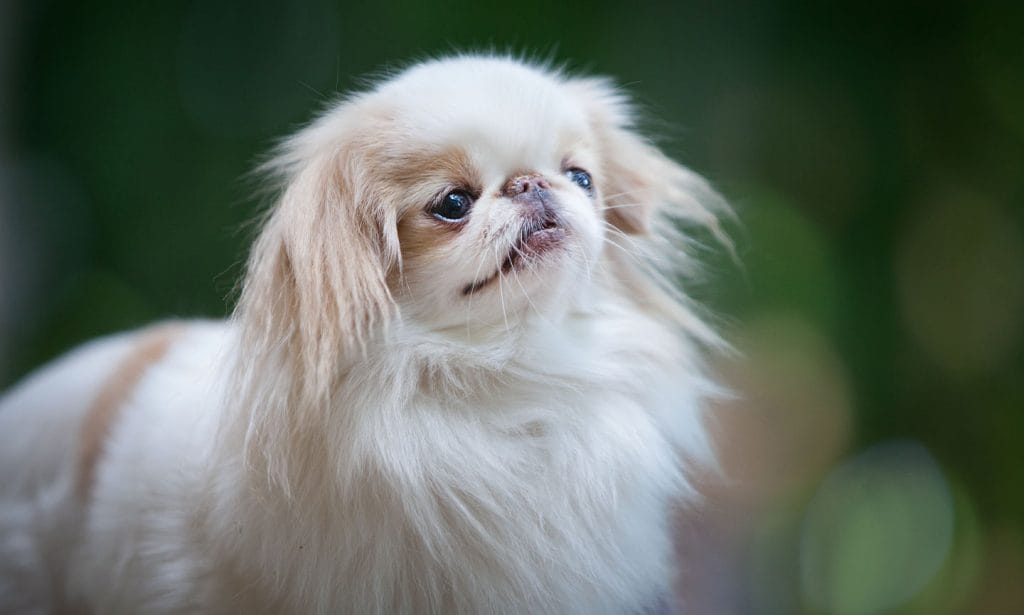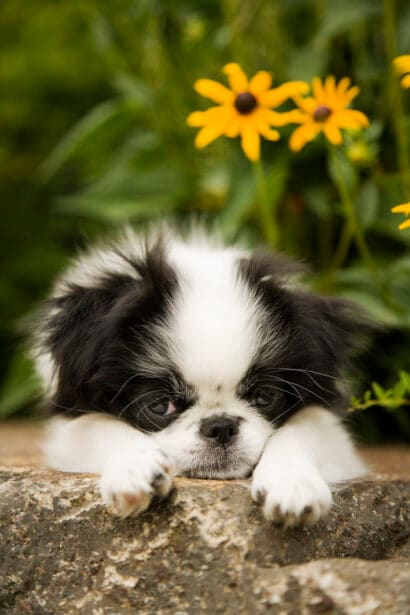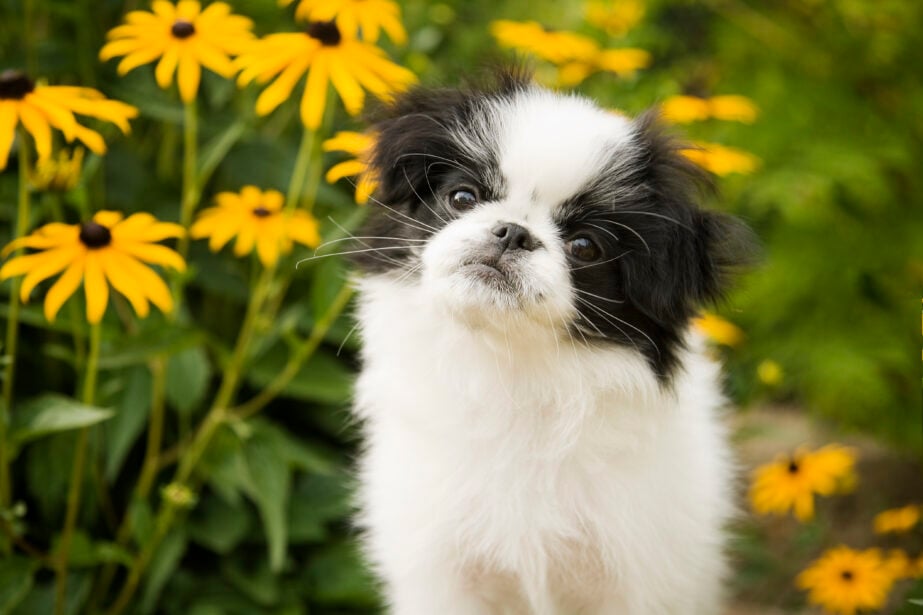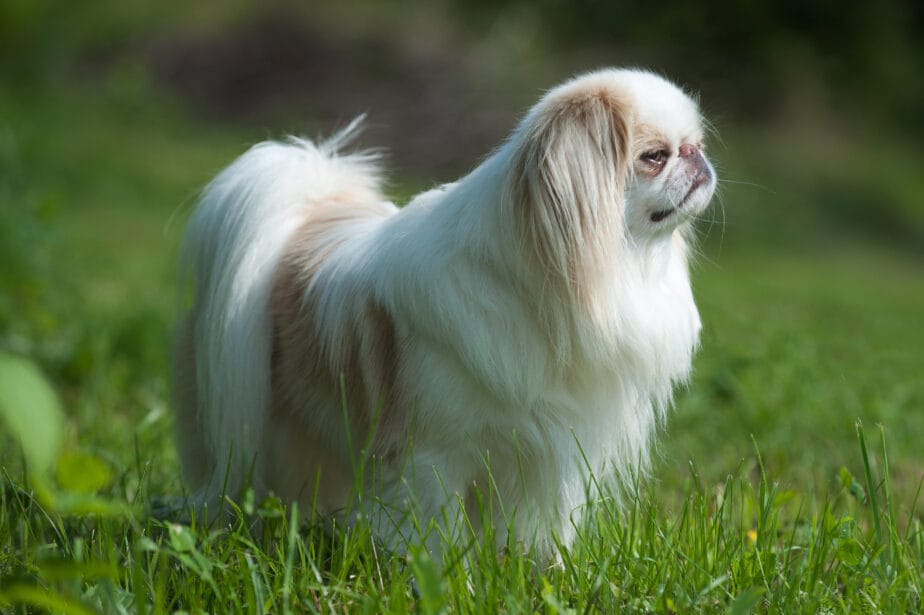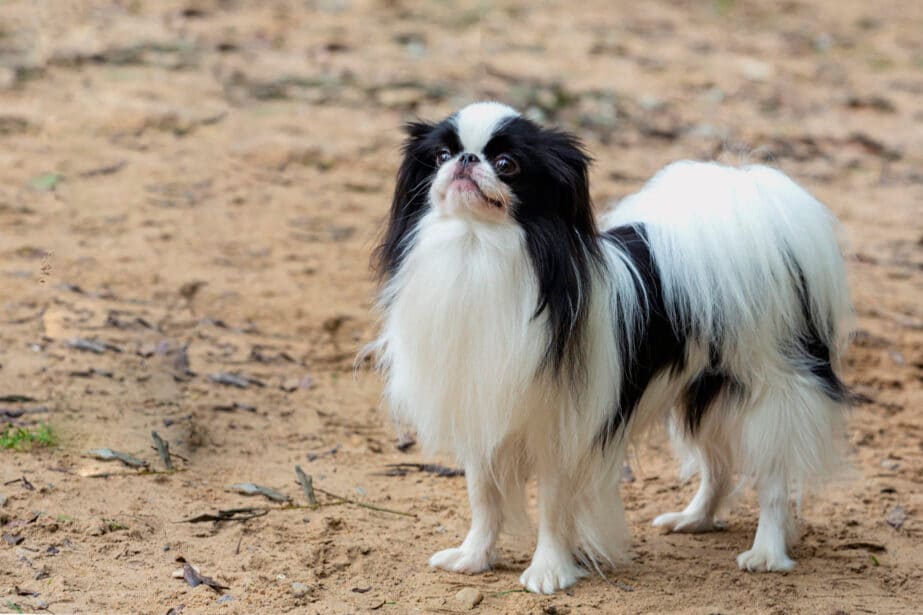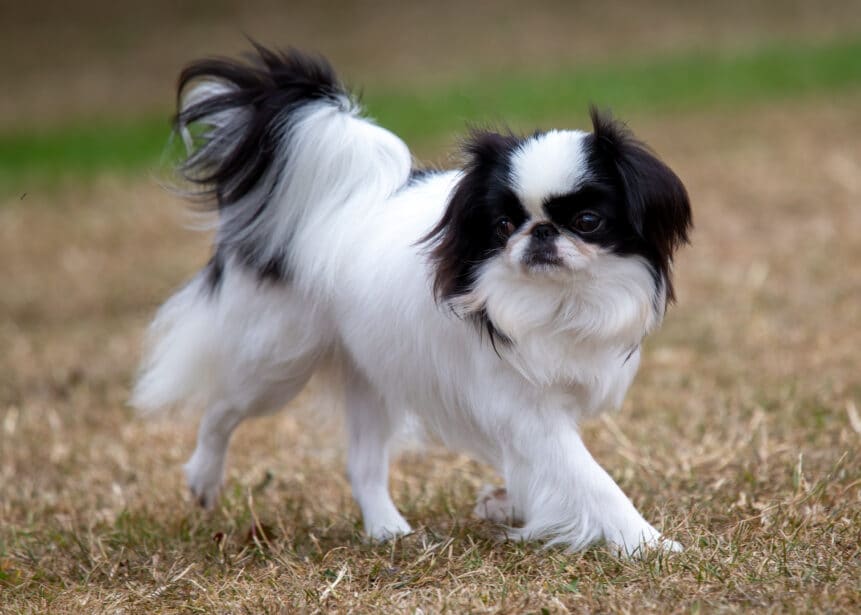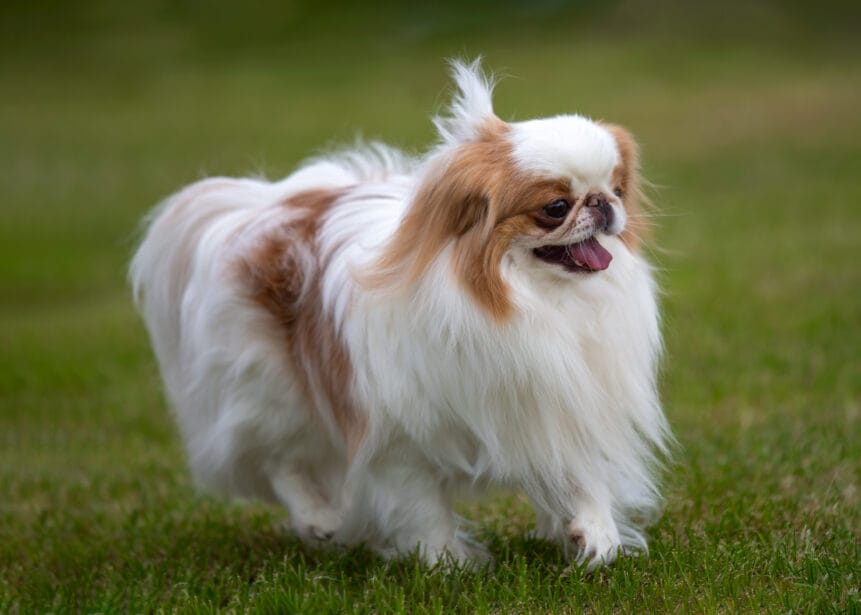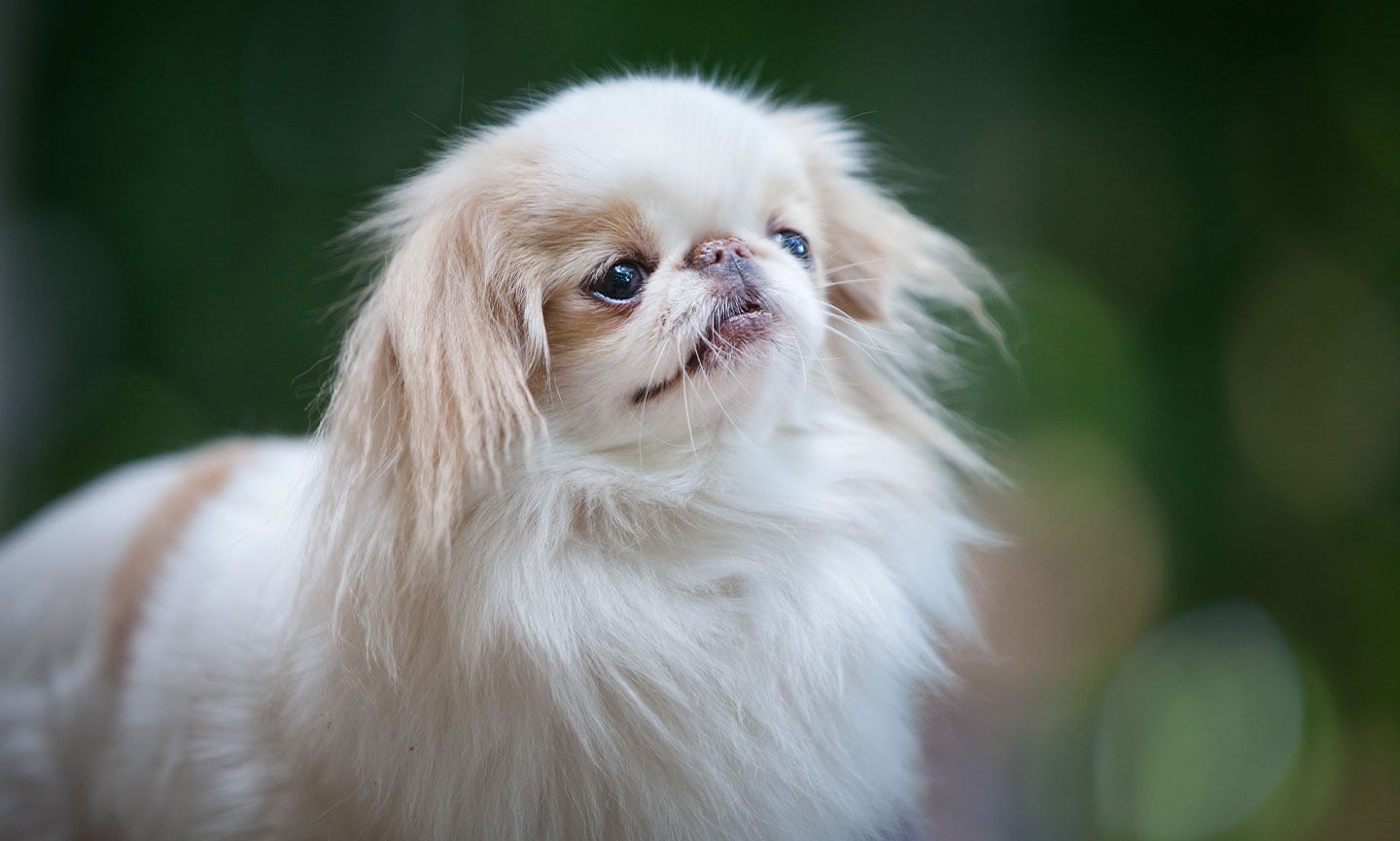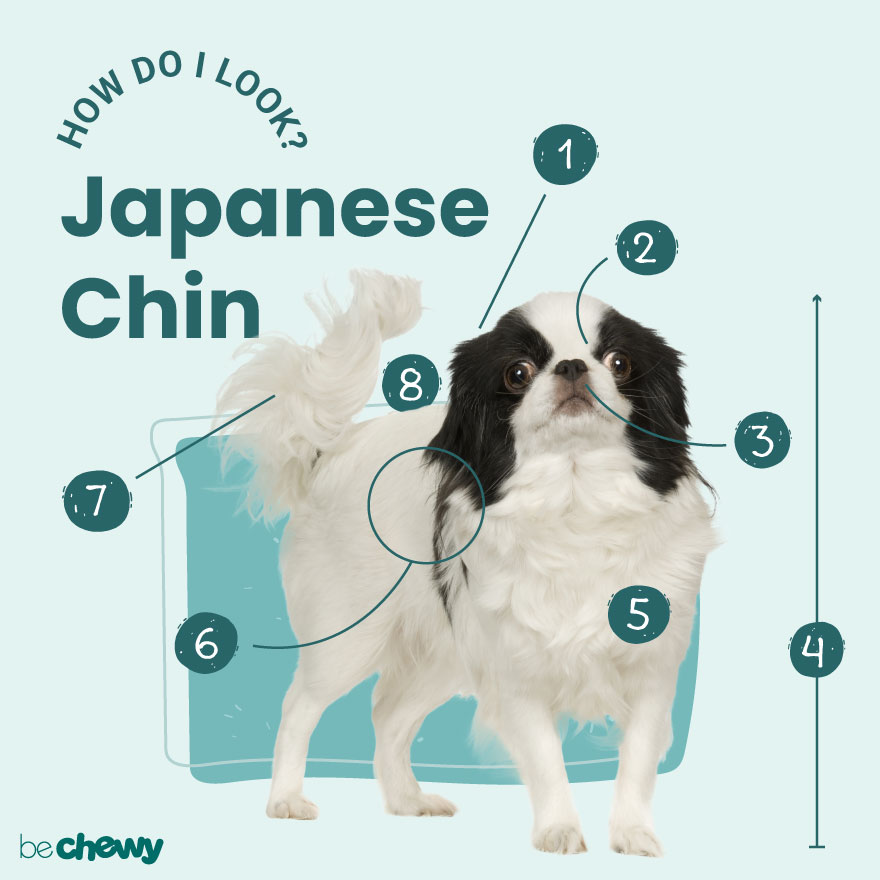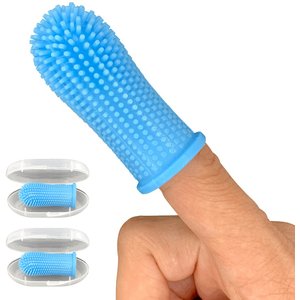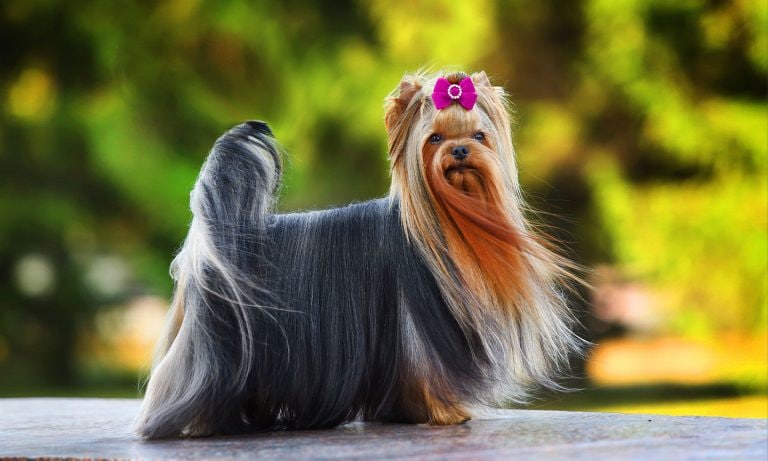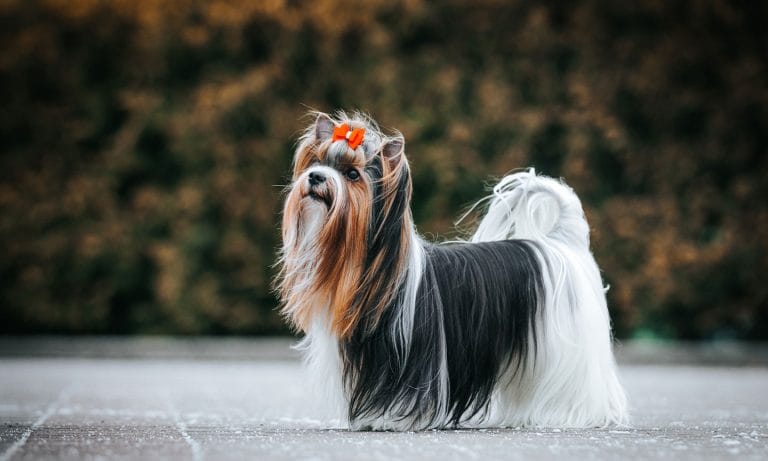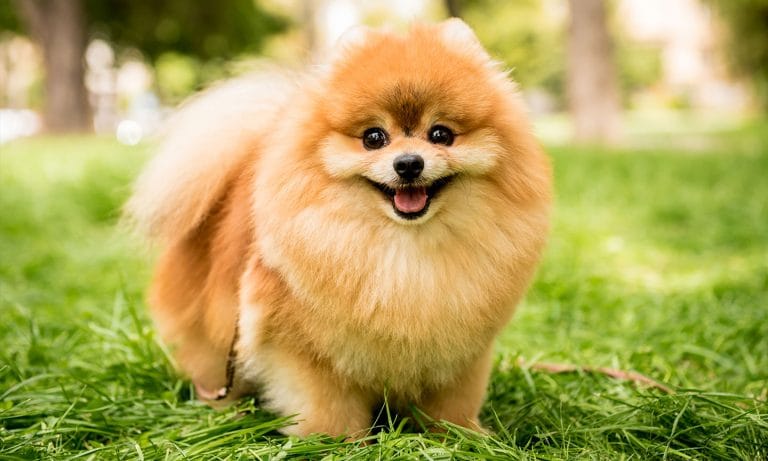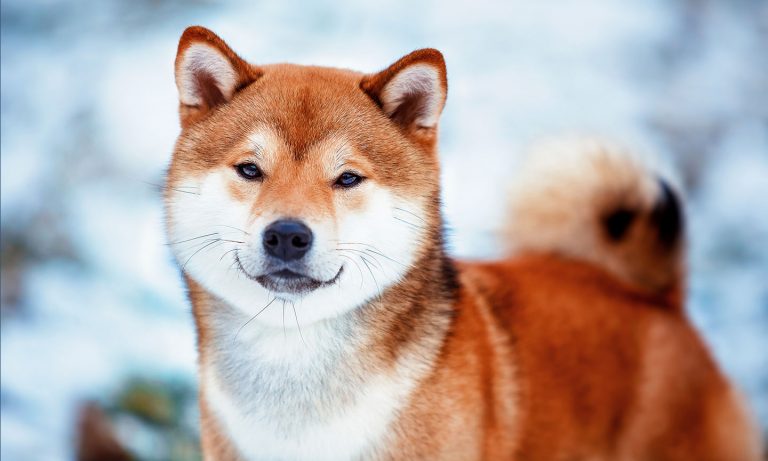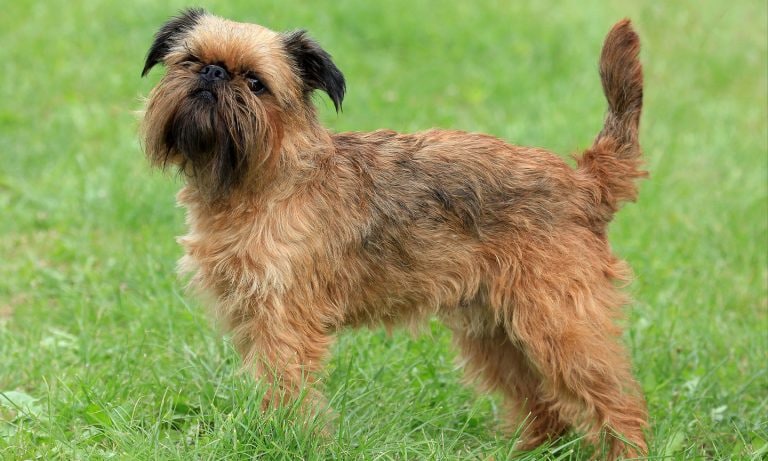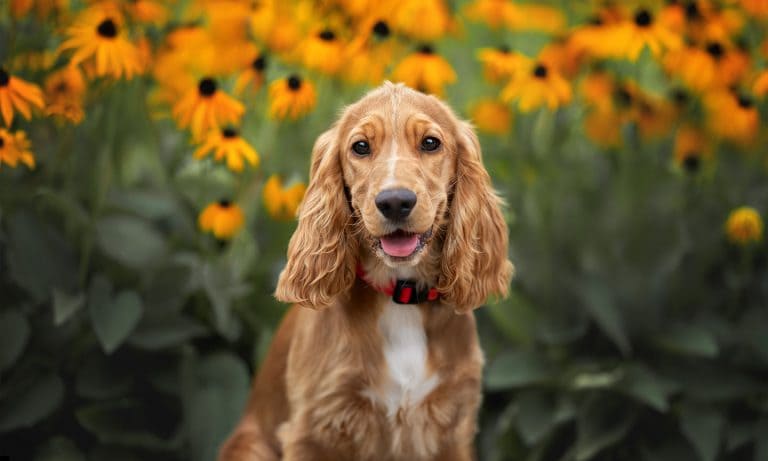The Japanese Chin doesn’t have family—they have servants (namely, you). This little lapdog was bred in the lap of luxury, and they expect you to remember that. A playful breed, the Japanese Chin will join you in singing (they’re known for their vocals) and dancing (their signature move is the “Chin spin”) all night long. And after a TikTok duet with your favorite influencer, they’ll be influencing you for a special treat. (And maybe their own TikTok account.)
Breed Snapshot
Temperament:
Strong-WilledBrightAmusingCoat Color:
Black And WhiteBlack Tan And WhiteLemon And WhiteRed And WhiteSable And WhiteWhite And Black
Best For
The Japanese Chin is a toy dog breed who's as affectionate as they are elegant. They thrive on companionship and are relatively easy to care for—even their silky coats require just moderate grooming. These pups are perfect for anyone seeking a charming, low-maintenance lap dog.
Japanese Chin Temperament
A noble companion with vocals only a parent could love is a great way to describe the personality of the Japanese Chin (aka the Japanese Spaniel). These dogs are relaxed and loving, and can be quite attached to their pet parent—all things that make them both perfect and overqualified for the position of lapdog. They don’t need a job to do; they just need to be with their people—especially when singing a duet with their person. Yes, these pups are singers, not barkers. They sing when the moment moves them, so make sure your karaoke machine is ready to roll. Born performers, they’re also known for doing the “Chin spin” dance when they get excited. (If you haven’t seen it, you should look that up. It’s adorable.)
Although playful and loyal, Chins can also be sassy and strong-willed—they have a mind of their own, and they may not follow your directions like a Lab will. With proper training, however, these intelligent dogs can learn to be a well-behaved family member.
Chins are considered catlike in that they groom themselves like a cat, they like to climb, and you’ll often find them perched on top of things, like the back of a chair or sofa. (And let’s not forget about their independent streak.) Cats are actually their BFFs, but they’ll need proper introductions and socialization with other dogs in the home.
How to Care for a Japanese Chin
Caring for a Japanese Chin dog is not as high-maintenance as you might think. Their grooming routine is relatively simple, as are their exercise needs. However, you will need to be consistent with their training because of their strong-willed streak—you can’t slack off because they’re just so darn cute.
Japanese Chin Health
While Japanese Chins have a lifespan of 10 to 12 years, the breed is prone to a few health issues. But knowledge is power. Being aware of these conditions can help your pup live a long and happy life.
- Cataracts: With cataracts, your pup looks like they have cloudy eyes. If your vet suspects this often-hereditary condition, they may refer you to a veterinary ophthalmologist to determine if your pup is a candidate for surgery.
- Epilepsy: Dogs with epilepsy will typically have their first seizure between 6 months and 5 years of age. Treatment is typically daily medication. Epilepsy is often hereditary and genetic screening testing is available.
- Brachycephalic Syndrome: Also called short-headed syndrome, this condition affects the breathing passage in dogs whose faces appear flattened or smooshed. This makes it difficult to breathe, especially in warm and humid conditions. Treatment is through managing your dog’s environment (making sure they don’t get overheated) and keeping them at a healthy weight. Some dogs may require surgery.
- Early Onset Heart Murmur: This condition is likely caused by degeneration of the heart valves. If your veterinarian detects a murmur, they may refer your pup to a veterinary cardiologist for an echocardiogram (ultrasound of the heart) to determine the cause.
- GM2 Gangliosidosis: Like Tay-Sachs disease in humans, this fatal, inherited neurological disorder has only been reported in Japanese Chins. Genetic screening testing is available so be sure to ask your breeder.
Japanese Chin History
Is it rude to call a dog a walking contradiction? First, we tell you that this dog is often described as cat-like. Now you’ll learn that they originated in China, not Japan. Here’s how that happened:
China bestowed this regal baby on Japanese dignitaries for their service to the country. Though descended from dogs of Chinese nobility, it was the Japanese who brought the canine into our consciousness and onto our laps.
Commodore Matthew Perry (no, not that Matthew Perry) was sent to Japan in the mid-1850s by then-United States President Franklin Pierce and Queen Victoria of the United Kingdom to establish trading posts with Japan on behalf of their respective countries. He returned with three sets of Imperial dogs as gifts for each of them (and a pair for himself). Two dogs survived, and he gave one to his daughter Caroline and her husband, August Belmont, Jr., who was the president of the American Kennel Club at the time.
But wait! Those two pups were never bred. It wasn’t until the trade treaty between America and Japan in 1858 that Chins started coming to America. Their novelty shot them to fame, and they became one of the most popular breeds of the time.
Though the AKC recognized the Japanese Chin in 1888, their popularity declined in the 20th century. But that just means when you bring a Chinese—oops—Japanese Chin puppy into your home, you will be one of few who can proudly proclaim that a member of your family descended from nobles.
Are you looking to add a Japanese Chin puppy to your family? You can find a reputable breeder on the AKC’s website. The average price for a puppy is $2,000. But for that, you’re getting a puppy who’s been screened for health and temperament issues and may come with pedigree papers. You can also contact a Japanese Chin rescue or watch for the breed at your local animal shelter. Search Chewy’s database of adoptable Japanese Chins in your area.
FAQs
Do Japanese Chins shed?
Japanese Chins don’t shed a lot. They’re great self-groomers, but they do shed seasonally. Chins need a good brushing once a week followed by a monthly bath to stay in tip-top shape.
Are Japanese Chins good family dogs?
Japanese Chins are great family dogs! Why? They were bred that way. It doesn’t matter if your family is one person or 10; they’re here to take it easy and hang out with you—preferably indoors and on your lap.
What are the most popular Japanese Chin mixes?
The most common Japanese Chin mixes (and their nicknames) are:
- Japanese Chin-Chihuahua mix (Chin-Wa)
- Japanese Chin-Pomeranian mix (Chineranian)
- Japanese Chin-Dachshund mix (Doxie Chin)
- Japanese Chin-Pekingese mix (Japeke)
- Japanese Chin-Yorkie mix (Jarkie)
- Japanese Chin-Maltese mix (Jatese)
- Japanese Chin-Shih Tzu mix (Jatzu)
- Japanese Chin-Poodle mix (Poochin)
Note: These are not purebred dogs but mixed breeds.
Do Japanese Chins bark a lot?
Japanese Chins do not bark a lot. In fact, these “Japanese Spaniels” are known to be great in condos or other multiple-dwelling housing structures because they keep their thoughts to themselves.

Top Takeaways
The Japanese Chin breed has come a long way, both literally and figuratively. Once kept for the comfort of nobles, they’re now content to keep you company on a Saturday night. How lucky are you? Sure, there might be a little judgment, but you have to ask yourself: Did we get our walk today?
Expert input provided by Dr. Julie Steller, a contract veterinarian serving shelter and family pets in Minneapolis, Minn., and Megan Janning, CPDT-KA, the training director at Fusion Pet Retreat in Minnetonka, Minn.
Breed characteristic ratings provided by veterinarian Dr. Sarah J. Wooten, DVM, CVJ, a veterinarian at Sheep Draw Veterinary Hospital in Greeley, Colorado; dog trainer and behavior consultant Irith Bloom, CPDT-KSA, CBCC-KA, CDBC, owner of The Sophisticated Dog, LLC, in Los Angeles; and certified animal behavior consultant Amy Shojai, CABC, in Sherman, Texas.
The health content was medically reviewed by Chewy vets.

Search for Adoptable Japanese Chins Near You
Female Names
- Daisy
- Lily
- Chloe
- Mia
- Bella
- Lucy
- Precious
- Izzy
- Lexi
- Piper
Male Names
- Gizmo
- Yoshi
- Max
- Ollie
- Zeus
- Oreo
- Loki
- Bailey
- Charlie
- Leo
Share:
